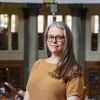
Professor Clare Barker
- Position: Professor of Contemporary Literature
- Areas of expertise: Contemporary literature and film; disability studies; medical humanities; postcolonial literature and film; Indigenous literature and film.
- Email: C.F.Barker@leeds.ac.uk
- Phone: +44(0)113 343 4750
- Location: 10.2.08 10 Cavendish Road
- Website: LivingBodiesObjects | Googlescholar | ORCID
Profile
I have been working at Leeds since 2012, having previously held a lectureship at the University of Birmingham. I first developed my interest in postcolonial literatures as a postgraduate student here in the School of English: I did an MA in Postcolonial Literature, and my PhD, at Leeds.
Research interests
My research focuses on representations of health, disability and biomedical research in contemporary, postcolonial and Indigenous literature and film. I have a longstanding interest in the ways in which disability, health, and illness are experienced, represented, and imagined across cultural contexts, and in how fiction can shape and transform our understandings of embodiment, medicine, health and ethics. This has led me to work across various fields including disability studies, medical humanities, and more recently environmental humanities.
My 2011 book, Postcolonial Fiction and Disability: Exceptional Children, Metaphor and Materiality, explores the intersection between disability studies and postcolonial literatures. It examines the metaphorical functions of disability within a range of texts that engage with decolonisation, where the figure of the disabled child often symbolises the postcolonial nation-state – ‘damaged’ and fragile, yet embodying the potential for radical difference. It argues that many postcolonial texts do not only deploy disability as metaphor, however, but also explore the materiality and lived experience of disability, representing disabled children as agents, citizens and knowers.
I enjoy working collaboratively and have undertaken several editorial projects that bring researchers together to shape new directions in our fields. I have co-edited special issues of the Journal of Literary and Cultural Disability Studies on ‘Disabling Postcolonialism’ (2010, with Stuart Murray) and ‘Disability and Indigeneity’ (2013, with Siobhan Senier), guest edited an issue of Moving Worlds: A Journal of Transcultural Writing on ‘Literature, Medicine, Health’ (2019), and guest edited an issue of BMJ Medical Humanities on ‘Global Genetic Fictions’ (2021). With my colleague Stuart Murray I co-edited The Cambridge Companion to Literature and Disability (Cambridge University Press, 2017), a book designed to be accessible for students and which brings together experts in disability studies to explore the literary representation of disability across historical periods from medieval to contemporary literature, across cultural locations and major genres, and using a range of critical approaches.
I am currently a Co-PI on the Wellcome-funded University of Leeds project LivingBodiesObjects: Technology and the Spaces of Health (2022-25), which centres on the development of a physical and virtual medical humanities ‘lab’ and explores ways of working that seek to make academic research culture more accessible, equitable and inclusive. I led our collaboration with the Bhopal Medical Appeal to develop digital and exhibition resources that tell the story of the two intertwined Union Carbide disasters in Bhopal, India: the 1984 gas disaster – a gas leak that killed many thousands of people and is known as the world’s worst industrial disaster – and the lesser known disaster of contaminated groundwater, which predated the gas disaster by around a decade and continues to cause serious illnesses and disabilities for many thousands of people in the present day. I have been involved in the GND Media podcast series, ‘Bhopal: Stories of an Ecocide’ and talk about our LBO collaborations with the Bhopal Medical Appeal in this Medical Humanities podcast episode. I am currently writing a book on storytelling about the Bhopal disasters in fiction, film, photography, campaigns and journalism.
Another ongoing project focuses on representations of genetics and biocolonialism in contemporary literature and film. Initially funded by a Wellcome Trust Seed Award, this project explores how genetic research (and biomedical research more widely) impacts upon researched communities, and focuses on literary and film texts that engage critically with the ways in which genetic research reproduces the extractive and oppressive dynamics of colonialism.
Academic Activities
- I am a member of the Wellcome Trust’s Humanities and Social Sciences Career Development Award interview panel.
Qualifications
- Postgraduate Certificate Learning and Teaching in Higher Education (University of Birmingham)
- PhD Postcolonial Literary Studies (University of Leeds)
- MA Commonwealth and Postcolonial Literatures (University of Leeds)
- BA English Literature (Durham University)
Professional memberships
- Fellow of the Higher Education Academy
- Northern Network for Medical Humanities Research
- European Association for Commonwealth Literature and Language Studies
- British Society for Literature and Science
- Native American and Indigenous Studies Association
- Association for the Study of American Indian Literature
Student education
I greatly enjoy teaching at both undergraduate and postgraduate levels. I teach on core UG and MA modules on contemporary and postcolonial literatures and offer option modules on disability representation, Indigenous literature and film, and biocolonial fictions. I am committed to offering accessible, inclusive teaching.
PhD supervision is one of my favourite parts of my job and I welcome enquiries from potential PhD students working in any of my research areas. My completed PhD students worked on the following topics:
- Shauna Walker, ‘A1 Nation: Health, the Body, and Interwar Literature’.
- Amy Redhead, ‘Disabling Discourses and Down's Syndrome: Representations of Down's Syndrome in the Documentary Genre’.
- Daisy Powell, ‘Austerity Fictions: Disability, Class and Resistance in Twenty-First Century British Literature and Film’.
- Josephine Rodgers, ‘Reframing Abortion: Near-Future Reproductive Rights Dystopias’.
- Alex Henry, ‘Unexplained Chronic Illness in Twenty-First Century British Women's Writing’.
- Emily Timms, ‘Postcolonial Representations of Age and Ageing in Caribbean and Aotearoa New Zealand Fiction and Film’.
- Katrina Longhurst, ‘Critical Strategies of Narrating Mental Illness in Contemporary Life Writing’.
- Lucy Rowland, ‘“Tortured Ecologies”: Environmental Disaster and Climate Discourse in Contemporary Women’s Speculative Fiction’.
- Saira Dogar, ‘Space-Body Dynamics in Selected Works by Kamila Shamsie and Uzma Aslam Khan’.
Research groups and institutes
- Medical Humanities Research Group

